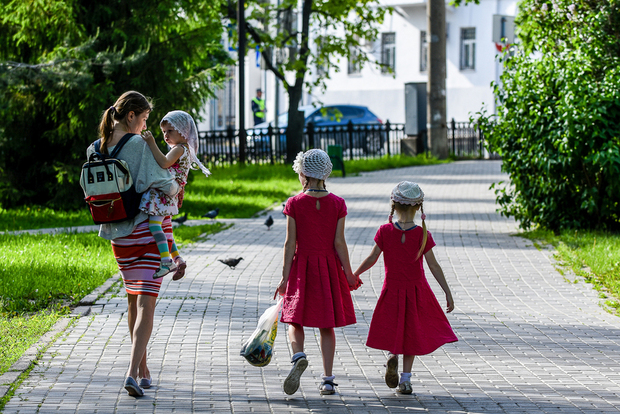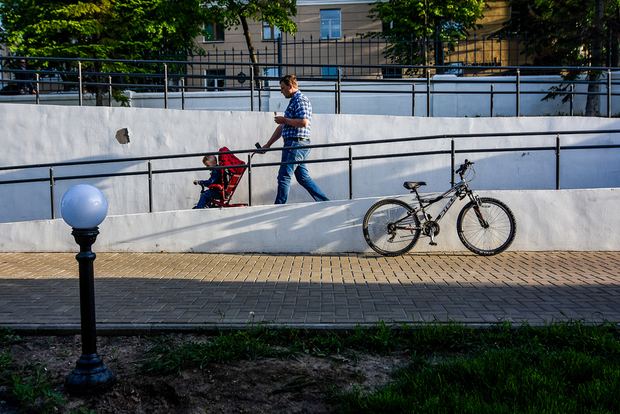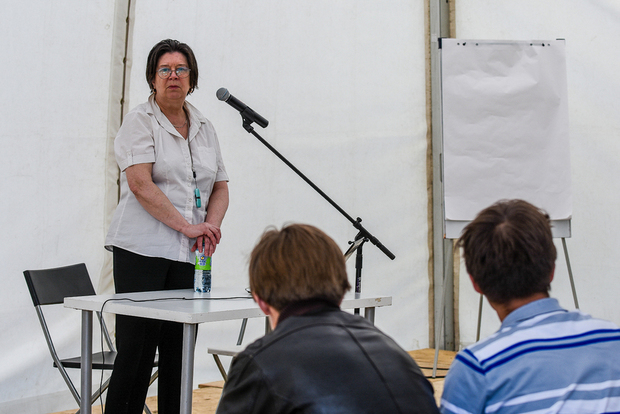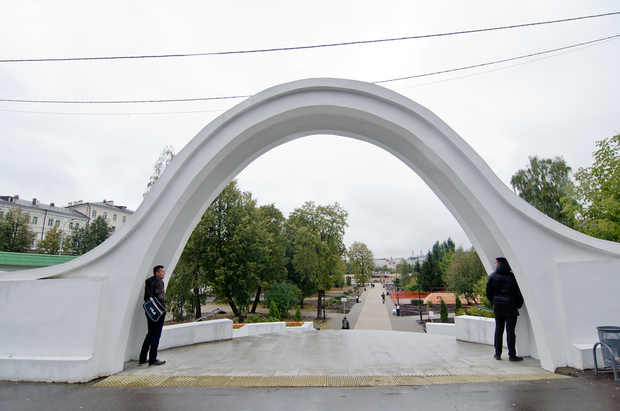''Imagine that women leave the labour market and become housewives''
European University Professor Elena Zdravomyslova about gender discrimination in Russia. Part 1
A lecture of Candidate of Sciences in Sociology, Professor of Department of Political Science and Sociology of the European University in Saint Petersburg, co-coordinator of Gender Studies programme Elena Zdravomyslova took place during the Summer Book Festival. In an interview to Realnoe Vremya, Elena Zdravomyslova told about gender discrimination, a trap Russian men are in. Part 1.
Boys are defenders, girls are mothers
Is gender discrimination more spread in Russia or in the West?
If we compare Russia with some countries where a feminist revolution took place, not only gender equality policy, discrimination is less there. There are societies where discrimination is more distinct than in Russia. It is Near East, Sub-Saharan countries, for example. There is a very strict control of sexuality, it is impossible to marry a man on your own, choose a partner where there are bans on certain types of jobs for women. All these signs of the absence of liberty for making a decision affect women more than men, justified by women's security strategies, some moral evidence, cultural conservation. Discrimination is a legal category. In sociology, we try to use more accurate words because there might be no discrimination but discriminatory practices or laws that don't have a point about men and women's equal possibilities. We are speaking about mechanisms of social exception, gender gaps, inequality.
How do gender roles affect people in Russia?
There are biological differences that can't be helped but recognised. We lived in a society where many aspects of differences between men and women were not discussed, ignored. They were not fully recognised, of course – women give birth in the end and men see service in the army. There are gender differences of socialisation. Service in the army is still considered a norm of men's socialisation: service in the army creates a real man, as many people think. And the state ideology promotes this idea showing that the army teaches young men to be self-sufficient, draft-based army gives chances of social mobility, a real man is taught to obey orders and apply violence himself. The attention to militarised socialisation is drawn more right now in the militarising society where a terrorist threat is constantly discussed. And for women peculiarities of socialisation are explained by preparation to become a mother. Social discussions repeat that a normal, right woman is who is ready and able to become a mother.

Social discussions repeat that a normal, right woman is who is ready and able to become a mother
In this case, how should men and women lift restrictions?
In this respect, society becomes more liberal but at the level of practices. Sometimes discourses say one thing, practices – another. What is the most important driver of the gender order? Nowadays it is important that ideas and practices of masculinity are changing. The situation of women changed throughout the 20 th century that is often called a century of a lasting gender revolution. They gradually got access to education, then conquered positions in paid labour or were forcedly called up. A double burden is a characteristic of women in the modern society – maternity (family obligations) and paid job. At the same time, gender roles of men changed much less because they did not do jobs that were marked in the society as feminine. Such an asymmetry of gender transformation is built into the cultural scheme of androcentrism – a system of ideas where what men do is evaluated higher than what women do. Men are excluded from unpaid household chores, childcare, nursing care, don't master jobs that are considered as feminine. Where did you see a man in a kindergarten? And they are much needed there.
Family labour don't repulse men
Why are not men in Russia emancipated like in the West?
Because there was a movement for gender equality of possibilities. There were not only feminine movements but also masculine that represented an alternative to brutal, militarised, aggressive masculinity that as a hegemony for a long time. For instance, a caring man who becomes an important agent of socialisation at a very young age. My daughter went to kindergarten in Germany where 3-4 boys and 2 girls were assistants. It was done consciously – these guys started to do a job considered as feminine during 5 years. We also have symptoms of such a movement to change the norm of masculinity. For instance, its effects can be seen in, for example, family labour.

Men are excluded from unpaid household chores, childcare, nursing care, don't master jobs that are considered as feminine
Do you support this initiative?
Yes, of course. It is already very widespread and even a trend in some social groups.
Life out of wedlock
Does living together without being married causes more gender discrimination than life without marriage?
Our colleagues and we did research about it. Relations are more equal when people live together than when relations between spouses are not registered. There is evidence in favour it. There are not mutual, firm, stable obligations that are confirmed by law, the partners have more freedom of choice. There is more room for unregistered relations because the juridical sense of marriage is not clear. Tradition can support religious marriage more now than registered civil marriage.

There is more room for unregistered relations because the juridical sense of marriage is not clear. Tradition can support religious marriage more now than registered civil marriage
At the same time, as our research shows, the break of a couple is less painful when the marriage was not registered. Now the marriage institution is promoted both commercially and ideologically. How much money people spend on this ritual! If there were nothing, it is not a problem to separate. There is less notoriety, less shame, it is unclear who is guilty. People register relations if they are going to have children, when they decided it or when the baby was already born.
Trap for men from the state
You say that ''state mechanisms work to use socially organised differences between sexes to its advantage and promote certain ideologies about what roles men and women should have''. In this case, will solution of the gender problem affect the solution of state problems (in economy, politics)? Is the gender problem solvable?
Gender problem is a cultural problem. At the same time, we need to consider that gender problems are not alone. They are linked in a complicated, multinational society with ethnic differences, both concerning class and age. We will probably achieve something for a middle-class family in Petersburg or Moscow. What if we pay attention to strengthening the conservative ideology in other different places of Russia? Our Chechnya is a terrifying story.
Gender differences are entangled into other cultural differences. In one class, women already earn, they have prestige and salary. But if you are in an environment where people stay without work for long, work in difficult conditions, you will see that violence in relations is very strong. It is either a rude word or assault or threats, and they are marked by gender.

We thought for a long time that gender is about social differences between men and women. But such a perspective is not enough
Both class position (education, profession, property) and sexual orientation define gender identity. We thought for a long time that gender is about social differences between men and women. But such a perspective is not enough. Right now gays are a discriminated group in the Russian society due to a law on homosexual propaganda ban.
For instance, a man is a homosexual and understands the society won't accept him. And he fights against nature and starts living with a woman. So does this kind of rejection at the legal level affect relations between men and women?
It was so many-many years ago. It was documented in different stories about Soviet life where men's homosexuality was criminalised and people tried to be or seem heterosexuals to correspond to ideas about normal sexual desire, mock relations and hidden relations at times. In other words, they did not announce their wives or girlfriends about their orientation who thought they married a heterosexual and turned out unhappy because lie always leads to unhappiness.
Modern people became more liberal in sexual relations to a great degree, gender limits are getting transparent. And they are constantly trying to make obey norms with the help of religious ideologies or some of our laws. And there is a divergence of the official matrix from the strict norm and that people want to choose on their own, they don't want to feel guilty while making a choice.

There is already such segments of the society where the burden of family budget lies on men's shoulders. One can do whatever with such a man. Our modern society turns there to make men main and dependent
Why is it all done? It is care or hypocrisy of the authorities to control?
We can say that already there is and there will be an effect of a gap between discourse and practice, an effect of the hypocrisy of the promoted conservative ideology. Very lawmakers think the society is so spoiled that their ideas can be cultivated and become normal with strict laws. But, in my opinion, this moralising pressure of the ideology and law is needed to legitimate and stabilise the regime. We see this turn of lawmakers and ideologists towards moral care, it is a turn towards the old morality, not recognition of freedom of choice as responsibility.
Such moral care appears when the country has problems in the economy, democracy. Most importantly, part of the elite wants to conserve its property and justify it by a cultural mission given to it. What are the social consequences of gender and conservative laws if they work? (I think they won't work.) As a result, women will be much less active on the social stage. Imagine that women leave the labour market, they become housewives. Men literally become breadwinners. Such segments of the society are already present where the burden of family budget lies on men's shoulders. One can do whatever with such a man. Our modern society turns to that side to make men main and dependent.
But is it a trap for men?
Yes, but men don't understand because they become the head of the family instead. They got subordinates whom they are responsible for, so they express their archaic masculinity. They have things to be proud of: ''I am a defender, I am a father, they must be grateful''. The man needs to make many concessions to conserve this advantage because salaries, the market are limited. He needs to find a seat in the hierarchy, follow the rules offered by business created together with the country.
Read about women's possibility to become Russian president and gender freedom in the second part of the interview with Elena Zdravomyslova.